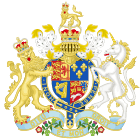Declaratory Act 1719 facts for kids
| Act of Parliament | |

|
|
| Long title | An Act for the better securing the dependency of the Kingdom of Ireland on the Crown of Great Britain. |
|---|---|
| Citation | 6 Geo. 1. c. 5 |
Quick facts for kids Dates |
|
| Royal assent | 7 April 1720 |
| Other legislation | |
| Repealed by | Repeal of Act for Securing Dependence of Ireland Act 1782 |
|
Status: Repealed
|
|
The Declaratory Act of 1719 was an important law passed by the Parliament of Great Britain. Its full name was An Act for the better securing the dependency of the Kingdom of Ireland on the Crown of Great Britain. This Act said that the British Parliament had the right to make laws for the Kingdom of Ireland. It also stated that the British House of Lords was the final court for appeals from Irish court cases.
People in Ireland who opposed the Act called it the Sixth of George I. This was because of the year King George I was ruling when it was passed. This law, along with an older one called Poynings' Law, showed that the Parliament of Ireland was not fully independent. Getting rid of this Act was a major goal for Irish leaders for many years. It was finally repealed in 1782.
Why the Act Was Needed
Before this Act, there was a long argument about which court had the final say in appeals from Ireland. Was it the Irish House of Lords or the British House of Lords?
This argument became a big deal because of a court case in 1709. It was between Maurice Annesley and his cousin Hester Sherlock. They were fighting over who owned some land in Naas, County Kildare.
- First, an Irish court ruled in favor of Maurice Annesley.
- Then, Hester Sherlock appealed to the Irish House of Lords, which decided she was right.
- But Annesley then took his case to the British House of Lords. This British court said Annesley was right.
The Irish court followed the British House of Lords' decision. However, Hester Sherlock appealed again to the Irish House of Lords. The Irish House of Lords then told the judges in the Irish court to follow its decision. When the judges refused, they were put in prison for not obeying the court. This caused a huge political fuss, much bigger than the land dispute itself.
How the Act Was Passed
The idea for this law was discussed in the British Parliament in 1719. When it was debated, some people were against it. They argued that the law seemed to only increase the power of the British House of Lords. Others said that Ireland had always had its own independent courts.
Despite these arguments, the bill passed in the British House of Commons on March 26, 1719.
What the Act Said
The Declaratory Act had two main parts:
- Section I said that the Irish House of Lords had been wrongly trying to change decisions from Irish courts. It clearly stated that the Kingdom of Ireland was under the control of the British Crown. It also said that the King, with the help of the Parliament of Great Britain, had "full power and authority to make laws" for the people of Ireland.
- Section II made it clear that the Irish House of Lords had no power to make decisions on appeals from any court in Ireland. It said that any attempts by the Irish House of Lords to do so were completely invalid.
What Happened After
The Irish House of Lords was very unhappy about losing its powers. The judges who had been imprisoned were soon released, but they were heavily criticized.
Even though some people thought the Irish House of Lords had caused the problem by being too bossy, the "Sixth of George I" remained a major source of anger for many years.
This Declaratory Act also served as a model for a similar law passed in 1766 for the American Colonies. That law, the American Colonies Act 1766, also caused a lot of anger. After Britain lost the American War of Independence, they started to be more understanding towards Ireland. Because of this, the Declaratory Act of 1719 was completely repealed in 1782.
 | John T. Biggers |
 | Thomas Blackshear |
 | Mark Bradford |
 | Beverly Buchanan |

